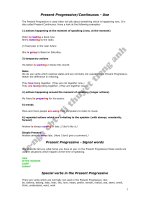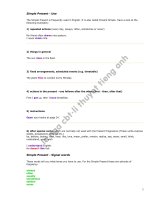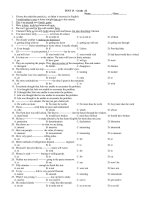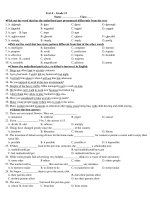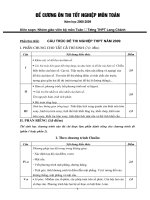Lí thuyết cơ bản ôn thi tốt nghiệp 2009 - simple present progressive
Bạn đang xem bản rút gọn của tài liệu. Xem và tải ngay bản đầy đủ của tài liệu tại đây (150.48 KB, 3 trang )
Present Progressive/Continuous - Use
The Present Progressive is used when we talk about something which is happening now. It is
also called Present Continuous. Have a look at the following examples:
1) actions happening at the moment of speaking (now, at the moment)
Peter is reading a book now.
She’s listening to the radio.
2) fixed plan in the near future
She is going to Basel on Saturday.
3) temporary actions
His father is working in Rome this month.
Note:
We do use verbs which express states and are normally not used with the Present Progressive.
Watch the difference in meaning.
They love being together. (They are not together now.)
They are loving being together. (They are together now.)
4) actions happening around the moment of speaking (longer actions)
My friend is preparing for his exams.
5) trends
More and more people are using their computers to listen to music.
6) repeated actions which are irritating to the speaker (with always, constantly,
forever)
Andrew is always coming in late. (I don't like it.)
Simple Present:
Andrew always comes late. (Here I don't give a comment.)
Present Progressive - Signal words
Signal words tell you what tense you have to use. In the Present Progressive these words are
used in situations which happen at the time of speaking.
now
at the moment
Look!
Listen!
Special verbs in the Present Progressive
There are verbs which are normally not used in the Present Progressive, like:
be, believe, belong, hate, hear, like, love, mean, prefer, remain, realize, see, seem, smell,
think, understand, want, wish
1
We sometimes use these words in the Present Progressive in the following situations:
He's seeing his father tomorrow. (fixed date)
The group is seeing the sights of Paris. (see in connection with tourists)
They are having a great time in Kapstadt. (have as an activity verb)
What's the matter with you? What are you thinking? - (to be worried about sth.)
If you are not sure with these verbs, use a good dictionary.
1) have as a full verb
affirmative sentence negative sentence question
I am having a bath. I am not having a bath. Am I having a bath?
he, she, it:
He is having a bath. He is not having a bath. Is he having a bath?
we, you, they:
We are having a bath. We are not having a bath. Are we having a bath?
1) do as a full verb
affirmative sentence negative sentence question
I am doing an exercise. I am not doing an exercise. Am I doing an exercise?
he, she, it:
He is doing an exercise. He is not doing an exercise. Is he doing an exercise?
we, you, they:
We are doing an exercise. We are not doing an exercise. Are we doing an exercise?
We often use the short forms with these verbs.
Form of the Present Progressive/Continuous
We use a form of to be (am, are or is), the infinitive of the verb and the ending –ing.
to be (am, are, is) + infinitive + -ing
Affirmative sentences:
I am playing volleyball.
He/she/it is playing volleyball.
We/you/they are playing volleyball.
NOTE: Use am with I, is with he, she, it and with all other pronouns are.
We often use short forms in affirmative sentences in the Present Progressive.
Negative sentences:
2
I am not playing volleyball.
He/she/it is not playing volleyball.
We/you/they are not playing volleyball.
NOTE: We often use short forms in negative sentences in the Present Progressive.
Questions:
In the Present Progressive we put the auxiliary (am, are or is) before the subject
(Auxiliary - Subject - Verb - Rest).
Am I playing volleyball?
Is he/she/it playing volleyball?
Are we/you/they playing volleyball?
Present Progressive - Spelling
Be careful with some words when adding -ing to the infinitive.
1) consonant after a short, stressed vowel at the end of the word
Double the consonant.
sit – he is sitting
put - he is putting
If the consonant is not stressed, we do not double it:
benefit - benefiting (Here we stress the first 'e', not the 'i'.)
In British English we double one -l at the end of the word:
travel - travelling
2) one -e at the end of the word
Leave out the -e.
write – he is writing
take – he is taking
BUT:
double –e: add -ing
see – he is seeing
3) verbs ending in -ie
Change 'ie' to 'y'.
lie - he is lying
4) verbs ending in -c
Change 'c' to 'ck'.
picnic - he is picnicking
3


